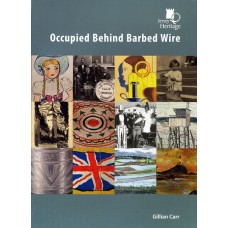Occupied Behind Barbed Wire
From 1942 to 1945, around 2,200 Channel Islanders were forcibly deported to German civilian internment camps in France, Germany and further afield. In Occupied Behind Barbed Wire, Gillian Carr looks at the at the experiences of deportation and interment as expressed through the range of artefacts and art produced by those interned. Using mainly their red cross parcels as raw materials, they recycled the wooden parcel crates, parcel wrappings and string, cardboard parcels, cellophane packing materials and empty food tins to make items which ranged from football trophies to communion chalices, chess sets to stage sets, and brooches to trinket boxes. Examining these often overlooked items, Carr describes their central importance in alleviating boredom, homesickness and anxiety; in forgoing friendships and strengthening both family relationships and Channel Islands identity; and in coping with, and expressing their deficance of, life behind barbed wire.

 My Account
My Account Shopping Basket
Shopping Basket

